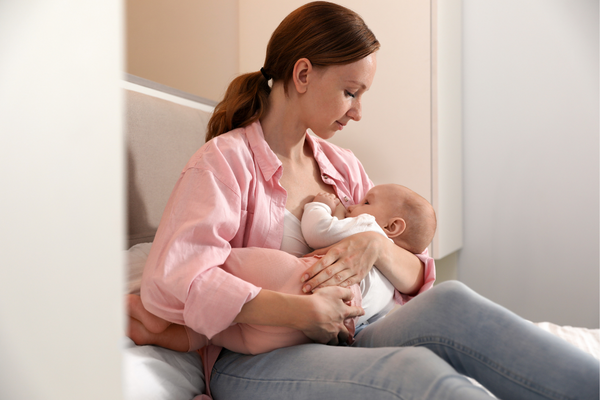What do you know about breastfeeding and cancer?
The health benefits of breastfeeding are endless for both mom and baby. You may know about many ways that breast milk benefits babies, but breastfeeding is also a powerful player in the long term health of the breastfeeding mother.
Breastfeeding can reduce the risk of certain cancers. Along with a healthy lifestyle and physical activity, breastfeeding can lower breast cancer risk and ovarian cancer risk.
Breast cancer is the most common cancer after skin cancer in women. In the US, 1 in 8 women will develop breast cancer during their lifetime. Breastfeeding has many health benefits for the mother, but women may not know just how strong the protection against breast cancer is. If a person breastfeeds 12 months or longer, they can reduce their risk of breast cancer by up to 26% (Hoyt-Austin et al., 2020). The benefits add up! The more months a woman breastfeeds over her lifetime, her protection against breast cancer continues to increase. The truth is, in spite of this important health benefit, many women do not make it to 12 months. This goal often requires education and support.


Ovarian cancer is the 5th leading cause of cancer death in women. This type of cancer usually affects women later in life, but breastfeeding may help lower risk. Breastfeeding reduces the risk of ovarian cancer in all women by as much as 24%.
Does breastfeeding risk reduction work if you have genetic risk factors or family history of breast and ovarian cancer?
Recent studies have also found breastfeeding has the same protective effects in high risk women with the BRCA1 and BRCA2 gene mutation, which indicates an increased risk of cancer. Breastfeeding longer is more beneficial even with cancer risk factors. If at-risk mothers continue to breastfeed for 7 months or longer, their risk of developing ovarian cancer is 32% less than those who had never breastfed.
What if I am a cancer survivor or get cancer while I am pregnant or breastfeeding?
Breast cancer is a serious and difficult reality for many women. It can have a significant impact on the long term future health of a woman.
Breast cancer treatments such as radiation or mastectomy can reduce a woman's ability to initiate breastfeeding or maintain a milk supply because they affect the breast tissue which is required for milk production. For example, a breast that has undergone a total mastectomy can not produce milk, but a mother can nurse and have a milk supply from the unaffected breast and may be able to nourish her baby from only one breast.
If you are breastfeeding and are diagnosed with breast cancer, it may require medications or therapies such as chemotherapy, that are unsafe for your baby.


If you have had cancer or develop cancer during pregnancy or while breastfeeding, you will want to have a healthcare provider on your team who is a breastfeeding and lactation medicine expert, and can carefully manage your journey for the health and well being of you and your baby. (ABM Protocol# 34: Johnson et al., 2020). With the right direction and support, many women are still able to breastfeed and produce milk in some capacity. The Academy of Breastfeeding Medicine’s “Find a Physician” Tool is a great place to locate an MD in your area who can help you navigate breastfeeding and cancer.
References
- Breast Cancer Risk in American Women. (2020, December 16). National Cancer Institute. Retrieved September 27, 2022, from https://www.cancer.gov/types/breast/risk-fact-sheet
- Hoyt-Austin, A., Dove, M. S., Abrahão, R., Kair, L. R., & Schwarz, E. B. (2020). Awareness That Breastfeeding Reduces Breast Cancer Risk. Obstetrics &Amp; Gynecology, 136(6), 1154–1156. https://doi.org/10.1097/aog.0000000000004162
- Johnson, H. M., Mitchell, K. B., Young, M., Noble, L., Bartick, M., Calhoun, S., Carceles-Fraguas, M. V., Elliott-Rudder, M., Feldman-Winter, L., Kair, L. R., Lappin, S., Larson, I., Lawrence, R. A., Lefort, Y., Marinelli, K. A., Marshall, N., Murak, C., Myers, E., Pina, M., . . . Zimmerman, D. (2020, July 1). ABM Clinical Protocol #34: Breast Cancer and Breastfeeding. Breastfeeding Medicine, 15(7), 429–434. https://doi.org/10.1089/bfm.2020.29157.hmj
- Kotsopoulos, J., Gronwald, J., McCuaig, J. M., Karlan, B. Y., Eisen, A., Tung, N., Bordeleau, L., Senter, L., Eng, C., Couch, F., Fruscio, R., Weitzel, J. N., Olopade, O., Singer, C. F., Pal, T., Foulkes, W. D., Neuhausen, S. L., Sun, P., Lubinski, J., & Narod, S. A. (2020, December). Breastfeeding and the risk of epithelial ovarian cancer among women with a BRCA1 or BRCA2 mutation. Gynecologic Oncology, 159(3), 820–826. https://doi.org/10.1016/j.ygyno.2020.09.037
- Ovarian Cancer Statistics | How Common is Ovarian Cancer. (n.d.). Retrieved September 27, 2022, from https://www.cancer.org/cancer/ovarian-cancer/about/key-statistics.html
- What Can I Do to Reduce My Risk of Breast Cancer? (2022, September 26). Centers for Disease Control and Prevention. Retrieved September 27, 2022, from https://www.cdc.gov/cancer/breast/basic_info/prevention.htm








